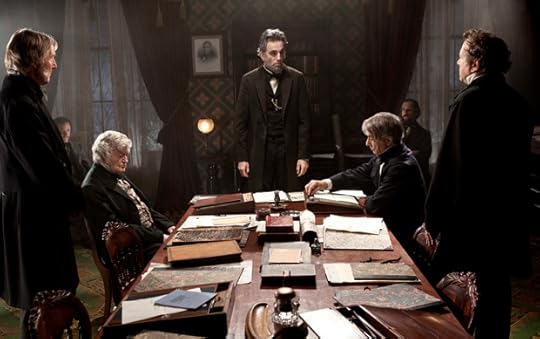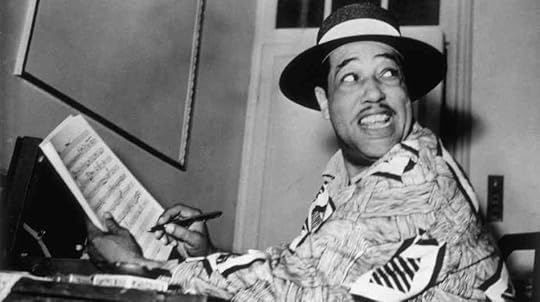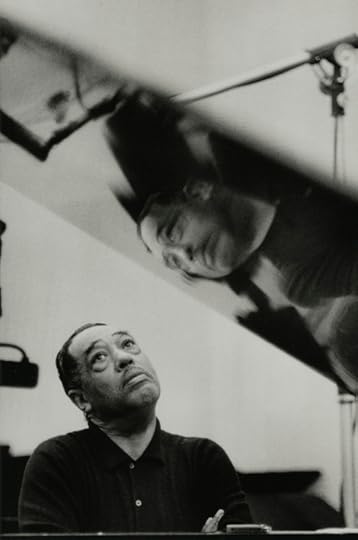Terry Teachout's Blog, page 100
February 17, 2013
TT: A pair of snapshots
 This is how I like to remember them, young and in love, the way they still looked when I was a child, though by then they were already starting to show visible signs of wear and tear. I didn't come along until they'd been together for eight years, at which point they knew in their bones that married life--adult life--was wholly unlike what they'd envisioned.
This is how I like to remember them, young and in love, the way they still looked when I was a child, though by then they were already starting to show visible signs of wear and tear. I didn't come along until they'd been together for eight years, at which point they knew in their bones that married life--adult life--was wholly unlike what they'd envisioned.My parents knew little of adult life when this snapshot was taken on the front porch of the ramshackle house where my mother grew up. All they knew was that they very much wanted to get married and start a family. The Great Depression and World War II were still fresh in their memories, and they took it for granted--not unreasonably--that the future, whatever it might hold in store for them, had to be better than that.
Some of it was and some of it wasn't. Their marriage was stormy, enough so that they actually separated for a time. But small-town people who tied the knot in 1948 didn't divorce save for the gravest and most intolerable of causes, so they gritted their teeth, stuck it out, raised two boys, and eventually discovered that they couldn't live without each other, at least not very well.
 This is how they looked in middle age, just before illness started to carve its long furrows on their faces. They still liked to sit together on porch swings--they always would--and there was no longer any doubt in their minds that they would spend the rest of their lives together, just as there is no doubt in my mind that they were right to do so.
This is how they looked in middle age, just before illness started to carve its long furrows on their faces. They still liked to sit together on porch swings--they always would--and there was no longer any doubt in their minds that they would spend the rest of their lives together, just as there is no doubt in my mind that they were right to do so.You can't imagine what it feels like to outlive your parents until you do, any more than you can imagine what it feels like to be married until you are. My father died of cancer in 1998, having suffered greatly for a long time. My mother lived on for fourteen more years, the first dozen of which were unexpectedly happy, the last two grievously hard (though not without periods of joy). I wouldn't have wanted either of them to have lived an hour longer than they did. Yet no day goes by when I don't find myself missing them both, sometimes fleetingly and sometimes piercingly.
As I headed down to Broadway the other night to see a show, I took out my cellphone and called up my brother in Smalltown, U.S.A. He was working at my mother's house, remodeling the family room in preparation for the day when he and my sister-in-law will move in .
 "What's up?" he asked.
"What's up?" he asked."Nothing," I said. "Nothing in particular. No news. I just felt like chatting." And so we did, talking idly and cheerfully of nothing in particular.
Then it hit me. "You know what?" I said. "I always used to call Mom at this time of day, right when I was going to a show. Now I'm calling you instead."
Neither one of us spoke for a long moment. Then we started chatting again.
* * *
Nancy LaMott sings "Some Other Time," by Leonard Bernstein, Betty Comden, and Adolph Green:
TT: Just because
(This is the latest in a series of arts-related videos that appear in this space each Monday and Wednesday.)
TT: Almanac
Eugène Ionesco, The Lesson
February 14, 2013
TT: Punchlines from another planet
* * *
Twenty years ago, Primary Stages put on a bill of six one-act comedies by a near-unknown playwright named David Ives. One-act plays are an appallingly hard box-office sell, but "All in the Timing" ran for more than 600 performances and established Mr. Ives as one of the top theatrical talents of his generation. Now Primary Stages is marking the 20th anniversary of the premiere by giving "All in the Timing" its first major New York revival. While I didn't see the 1993 production, I can't imagine how it could have been better than this glittering version, staged by John Rando, Mr. Ives' frequent collaborator, and acted with colossal éclat by five young actors who fit together like the pieces of a platinum-plated jigsaw puzzle....
 What made the popular success of "All in the Timing" so noteworthy is that Mr. Ives' brand of humor is anything but simple. Indeed, it has far more in common with conceptual art--or alternate-reality science fiction--than sketch comedy....
What made the popular success of "All in the Timing" so noteworthy is that Mr. Ives' brand of humor is anything but simple. Indeed, it has far more in common with conceptual art--or alternate-reality science fiction--than sketch comedy....Mr. Ives' hapless characters are all trying to overcome seemingly insurmountable obstacles, usually in the most circuitous of ways. In "The Universal Language," for instance, a sad, mousy young woman with a stammer answers an ad for a school that purports to teach an Esperanto-like language called Unamunda in which the word for the woman's problem is "tonguestoppard." Not only is she the school's first and only pupil, but the teacher turns out to be...and I'll leave it at that. Suffice it to say that teacher and pupil are looking for the same thing--surcease from what a less pretentious playwright might call existential loneliness--and that, against all odds, they find it.
It's hard to do "All in the Timing" badly, which explains why it became one of the most frequently produced American plays of the 20th century. To do it well, however, requires a combination of preternaturally exact directorial timing and a cast whose members are alert to the underlying pathos of Mr. Ives' bizarrely skewed comic situations. Mr. Rando has got the first point covered--he's one of this country's finest directors of comedy--and his cast self-evidently understands what makes all six plays tick....
You'd think that a play starring Ethan Hawke, Vincent D'Onofrio and Zoe Kazan would be worth seeing, but if you've seen "Clive," Jonathan Marc Sherman's modernized version of Bertolt Brecht's "Baal," you now know better. Except for the acting, "Clive" is perfectly awful, a monstrously self-indulgent show about a monster of self-indulgence in which Mr. Hawke plays a booze-and-dope-sodden downtown songwriter who destroys everything he touches, ending with himself, though not soon enough....
* * *
Read the whole thing here .
TT: Talky talkies
* * *
If you Google "Lincoln" and "talky," you'll get two million matches, very few of which are referring to the Gettysburg Address. Whether they liked it or not, pretty much everybody who's seen Steven Spielberg's biopic seems to think that it's...well, kind of wordy. In an age when the average length of time between explosions in big-budget Hollywood movies has been officially computed (by me, anyway) to be 26.4 seconds, that's an attribute sufficiently surprising to inspire near-universal comment.
For those of us who see more plays than films, though, it's no surprise at all. The script of "Lincoln" is by Tony Kushner, the author of "Angels in America," who is not a screenwriter by trade but a playwright. Plays are talky by definition, and Mr. Kushner's plays are really talky, right down to the titles....
 The only thing that surprised me about "Lincoln" is that most of the critics who reviewed the film seem not to have grasped what should have been apparent right from the start, which is that "Lincoln" is at bottom a play with pictures, not a screenplay. Yes, Mr. Spielberg tarted it up with "Gone With the Wind"-style crowd scenes and snippets of "Saving Private Ryan"-type carnage, but for the most part he seems to have taken what Mr. Kushner gave him and run with it. John Podhoretz, who reviewed "Lincoln" for the Weekly Standard, a political journal, called it "a drawing-room political drama." That's right on the nose, since virtually everything of consequence that happens in "Lincoln" could just as easily have happened on a stage. In scene after scene, the characters sit in a room talking politics, and no attempt is made to leaven their conversations with action of any kind.
The only thing that surprised me about "Lincoln" is that most of the critics who reviewed the film seem not to have grasped what should have been apparent right from the start, which is that "Lincoln" is at bottom a play with pictures, not a screenplay. Yes, Mr. Spielberg tarted it up with "Gone With the Wind"-style crowd scenes and snippets of "Saving Private Ryan"-type carnage, but for the most part he seems to have taken what Mr. Kushner gave him and run with it. John Podhoretz, who reviewed "Lincoln" for the Weekly Standard, a political journal, called it "a drawing-room political drama." That's right on the nose, since virtually everything of consequence that happens in "Lincoln" could just as easily have happened on a stage. In scene after scene, the characters sit in a room talking politics, and no attempt is made to leaven their conversations with action of any kind.What's more, the talk is essential, since the subject of the film, the congressional debate over the ratification of the Thirteenth Amendment, which outlawed slavery in America, will be all but unintelligible to viewers who don't know the history of the Civil War going in. But Messrs. Spielberg and Kushner operated on the assumption that what Lincoln and his colleagues have to say is so inherently interesting that the audience will listen to it--and their assumption was correct.
While I've been skeptical about most of Mr. Kushner's plays, I'm delighted that he and his famous collaborator have succeeded in persuading large numbers of Americans to sit still and listen to a movie. The contemporary notion that it's somehow inherently bad for a film to be "talky" has done grave damage to the culture of American movie-making...
* * *
Read the whole thing here .
TT: Almanac
Mark Twain, Adventures of Huckleberry Finn
THE DUKE AND THE REDS
February 13, 2013
TT: So you want to see a show?
Here's my list of recommended Broadway, off-Broadway, and out-of-town shows, updated weekly. In all cases, I gave these shows favorable reviews (if sometimes qualifiedly so) in The Wall Street Journal when they opened. For more information, click on the title.
BROADWAY:
• Annie (musical, G, reviewed here)
• Once (musical, G/PG-13, nearly all performances sold out last week, reviewed here)
OFF BROADWAY:
• Avenue Q (musical, R, adult subject matter and one show-stopping scene of puppet-on-puppet sex, reviewed here)
• The Fantasticks (musical, G, suitable for children capable of enjoying a love story, reviewed here)
IN ORLANDO, FLA.:
• Othello (Shakespeare, PG-13, closes Mar. 16, reviewed here)
CLOSING SOON ON BROADWAY:
• The Mystery of Edwin Drood (musical, PG-13, closes Mar. 10, reviewed here)
• The Other Place (drama, PG-13, closes Mar. 3, reviewed here)
• Who's Afraid of Virginia Woolf? (drama, PG-13/R, closes Mar. 3, reviewed here)
CLOSING SOON IN WEST PALM BEACH, FLA.:
• A Raisin in the Sun (drama, PG-13, closes Mar. 3, reviewed here)
CLOSING NEXT WEEK IN ORLANDO, FLA.:
• Laughter on the 23rd Floor (comedy, PG-13, closes Feb. 24, reviewed here)
CLOSING NEXT WEEK ON BROADWAY:
• Picnic (drama, PG-13, closes Feb. 24, reviewed here)
• Who's Afraid of Virginia Woolf? (drama, PG-13/R, closes Mar. 3, reviewed here)
TT: Almanac
Mark Twain, The Innocents Abroad
February 12, 2013
TT: Taking pains
 I just finished combing through the entire manuscript of Duke twice in a row, and I uncovered numerous typos, errors, solecisms, redundancies, and omissions of various and sundry kinds. None of them, I'm relieved to say, was horrendous. (I got all of those blunders out of the book when the Ellington scholar Steven Lasker fact-checked the manuscript in December.) Nevertheless, they're still mistakes, and I found each one to be individually exasperating.
I just finished combing through the entire manuscript of Duke twice in a row, and I uncovered numerous typos, errors, solecisms, redundancies, and omissions of various and sundry kinds. None of them, I'm relieved to say, was horrendous. (I got all of those blunders out of the book when the Ellington scholar Steven Lasker fact-checked the manuscript in December.) Nevertheless, they're still mistakes, and I found each one to be individually exasperating.No, I'm not going to share any of them with you. A biographer has his pride. But the fact that they're there--or, rather, were there--embarrasses me no end. It also makes me wonder whether other biographers go to a similar amount of trouble to polish their manuscripts.
The vast majority of the changes that I'll be making after Lauren Marino of Gotham Books sends me back the copyedited manuscript of Duke, after all, are finicky little fixes whose sole purpose is to improve the book's style. Earlier this morning, for instance, I changed "And while their leader sounded nervous when speaking from the stage..." to "And while their leader sounded nervous on stage..." That's obviously not a significant change, but it really does make that sentence sound a tiny bit better.
Do such niceties matter to the average biographer? Somehow I doubt it, especially after having reviewed at least a hundred-odd biographies, most of which were unstylishly written and a fair number of which contained sentences so tin-eared that I wondered how any self-respecting author--or publisher--could have let them get into print.
Not long after I sent in the manuscript of Pops, I wrote a nuts-and-bolts posting about the process of writing the book in which I made the following claim:
I've sought to write a narrative biography of Armstrong that is comparable in seriousness and scope to such "definitive" high-culture biographies as W. Jackson Bate's Samuel Johnson, George Painter's Marcel Proust, or David Cairns' Berlioz. Next to no popular-music biographies have aspired to the high standards set by these books, but it seemed self-evident to me that Louis Armstrong was a figure of similar artistic and cultural significance, and so deserved to be written about in the same way.
 I applied the same standards to Duke, and there was never a moment when I was unaware of the fact that I was writing about a great artist. It's always seemed to me that when you write about somebody who makes beautiful art, you should try to write beautifully. If you don't, there'll be an inescapable incongruity between the masterpieces that are your ultimate subject matter and the way in which you describe how they came into being.
I applied the same standards to Duke, and there was never a moment when I was unaware of the fact that I was writing about a great artist. It's always seemed to me that when you write about somebody who makes beautiful art, you should try to write beautifully. If you don't, there'll be an inescapable incongruity between the masterpieces that are your ultimate subject matter and the way in which you describe how they came into being.That's a hard mark to hit when you're writing about the man who composed "Ko-Ko," and I wouldn't dream of claiming that my book is anywhere near as beautiful as Duke Ellington's music. What I hope is that it's worthy of its subject.
Here's a paragraph from Duke that I didn't change at all when I copyedited the manuscript:
In 1965 he complained that most Americans "still take it for granted that European music--classical music, if you will--is the only really respectable kind....jazz [is] like the kind of man you wouldn't want your daughter to associate with." He sought the same respect for his own music, in which the seeming contradictions of his background, part bourgeois and part street, were productively embodied. From "Black and Tan Fantasy" to Black, Brown and Beige, he had sought to fuse the nostalgic sentimentality of his mother's beloved salon ballads with the blunt sexuality of the blues. He longed to make a lady out of jazz--even though she was already his mistress. That was why he brought her to Carnegie Hall. He had something to prove.
While this passage may strike you as a bit purple, it's representative of what I was trying to do. If you don't like it, you won't like Duke. If you do...well, there's plenty more where that came from.
* * *
Duke Ellington's "Ko-Ko," recorded in 1940:
Terry Teachout's Blog
- Terry Teachout's profile
- 45 followers



